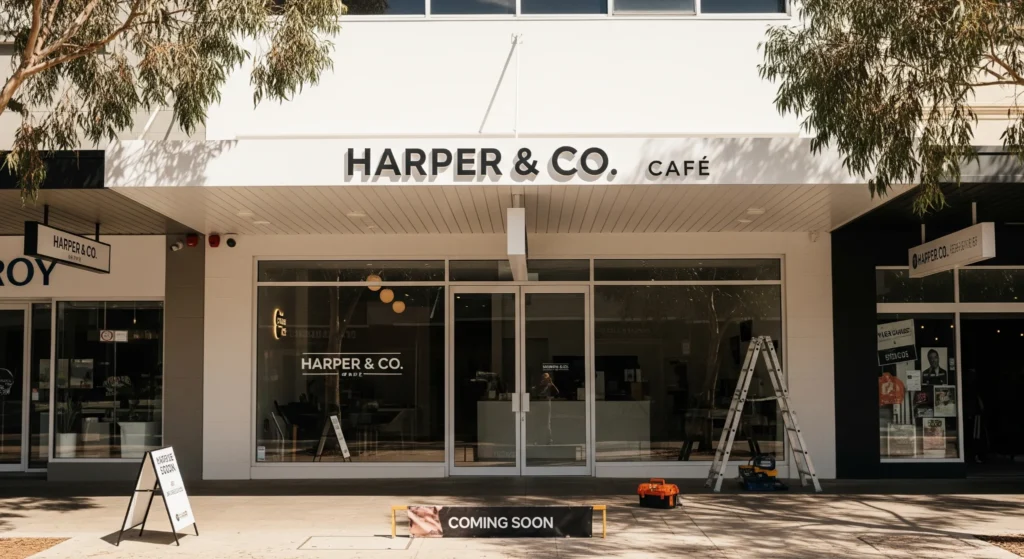Opening a new business location can feel exciting. But it can also be risky if you miss critical steps. Every decision—whether it’s choosing the correct location, signing a lease, or investing in business signage and branding—affects your success in Entrepreneur.
So, you should consider the following things before you open a new business location.
- Start with a strong business expansion strategy
- Do proper market research
- Choose a suitable location
- Do competitor and foot traffic analysis
- Review local zoning and lease agreement regulations
- Prioritise strong business signage and branding, and more.
This guide helps you avoid costly mistakes. You’ll see where to spend, what to check, and how to plan for growth.

10 Things to Consider for Opening a New Business Location
Here are 10 things every entrepreneur should consider before opening a new business location.
1. Start with a Strong Business Expansion Strategy
You need a clear business or Entrepreneur expansion strategy before signing anything. Remember, without a proper plan, you can fail in your business. According to a US government Survey, 20.4% of businesses fail within the first year.
Ask yourself:
- Can you financially support a second site for at least 12 months?
- Do you have trained staff ready?
- Does your supply chain handle extra demand?
Without these answers, opening a new store may strain your business in the new location.
Expand your view—this related post holds ideas you’ll want to explore right now.

2. Do Market Research for New Locations
Every location has unique buying habits. You need market research for new locations to know if customers want your product.
Target customer demographics reveal what to sell, how to price, and which promotions are most effective. Demographics is a statistical view of the population that includes aspects such as age, income, family status, gender, occupation, etc. Without this, you may serve the wrong market.
According to the Australian Bureau of Statistics, average individual income in QLD rose from $660 in 2016 to $787 in 2021, while family income grew from $1661 to $2024. With 41.2% of families having children, these insights help you strategically choose a location and product mix Entrepreneur.
3. Run Competitor Analysis in the Area
Competition is not always bad. But you must understand it.
You analyse how many businesses or Entrepreneur sell similar products. You look at pricing, service style, and reputation. A busy competitor street means strong demand, but it also means more choices for customers.
If competitors dominate, you either need a sharper edge or a different location.
4. Focus on Choosing the Right Location
Location determines visibility and convenience. A hidden shop can fail even with great products.
When choosing the correct location, check:
- Neighbourhood visibility: Can drivers or walkers see your building signage?
- Proximity: Are you close to suppliers or target customers?
- Growth trends: Is the area attracting new residents or businesses?
High-visibility sites often cost more, but they can save you on advertising.
5. Do a Foot Traffic Analysis and Check Accessibility and Parking Options
For many businesses, sales rely on foot traffic analysis. Retailers, cafes, and service shops depend on walk-ins. You count people at different times and compare the numbers on weekdays to those on weekends.
ABS data shows Brisbane Inner City hosts 30% of workers. The South sees 50,000 commuters daily, the North 36,000, and the West 34,000. These numbers highlight potential customers.
Always check accessibility and parking options—complicated parking or costly CBD access can push customers away.
6. Prioritise Building Signage, Strong Business Signage, and Branding
You can’t ignore signage. Building signage is often your first customer impression. If people can’t find you, they won’t enter.
Signage matters more than many think. A FedEx survey shows,
- 76% of consumers entered a store because of signage.
- 60% said poor signage stopped them from entering.
- 68% believe good signage reflects product quality.
Business signage and branding also drive recognition. Consistent colours, fonts, and logos build trust.
7. Review Local Zoning Regulations and Commercial Lease Agreements
Zoning decides what type of business is allowed in a location. You can’t assume. Local zoning regulations may block retail in residential areas. Always confirm before signing.
Next, check commercial lease agreements. Look for clauses on:
- Rent increases
- Fit-out responsibilities
- Signage restrictions
A bad lease can sink profits. You may pay hidden costs like maintenance fees. Always consult a lawyer before committing.
Get the proper local business permits and licenses. Operating without them risks fines and closure.
8. Weigh the Long-Term Growth Potential
Don’t just look at current demand. You check the area’s long-term growth potential.
Ask:
- Are there new housing projects nearby?
- Is the council investing in roads or transport?
- Are demographics shifting in your favour?
Suburbs like Brisbane, with rapid housing growth and a significant 42.7% house price increase, exhibit higher long-term retail potential than stable areas like the West End.
A short-term, cheap lease in a declining neighbourhood may cost more in lost growth.
9. Understand the Cost of Opening a New Store
Opening a store isn’t cheap. You must budget for the business setup at the specific location where you plan to establish your new business.
The costs include:
- Rent
- Wages
- promotion
- Insurance
- Utilities and power
- Shipping costs
- Equipment maintenance
- Phone and internet, etc.
First, you need to calculate your business costs and determine if you can sustain them for a specific time frame.
You can avoid risk by planning at least 12 months of expenses without relying on profits.
Final Thought
Opening a new business or Entrepreneur location takes more than excitement. You must plan your business expansion strategy, check local zoning regulations, review commercial lease agreements, and budget carefully for setup. You must also invest in strong building signage and branding for visibility.
At Signage 4 Business Group, they help you stand out. They provide custom signage design and professional signage installation to match your location and branding. Their solutions improve visibility, attract the right customers, and meet local requirements. When you’re ready to expand, you can rely on them to make sure your new site is impossible to miss.
Curiosity never ends—explore more and uncover fresh knowledge at Management Works Media.






